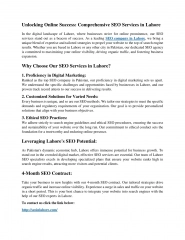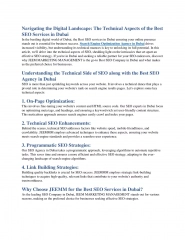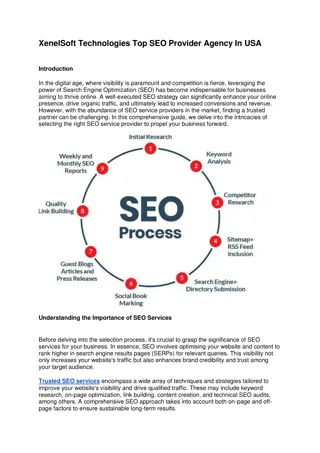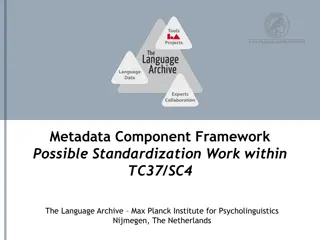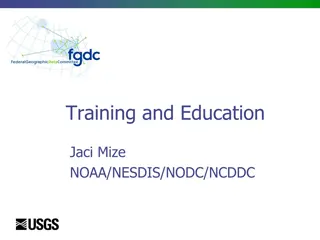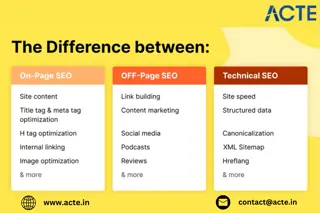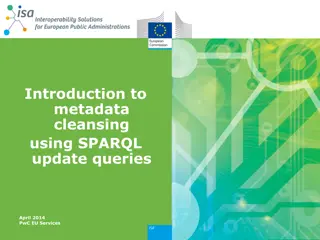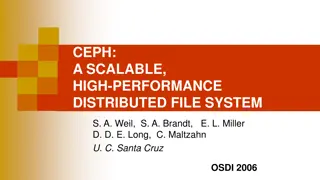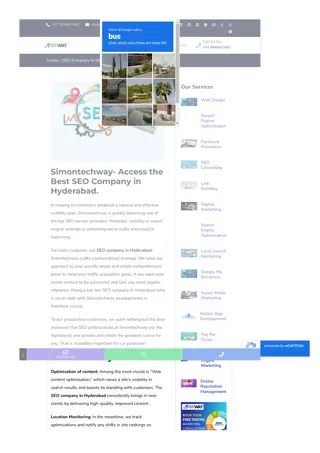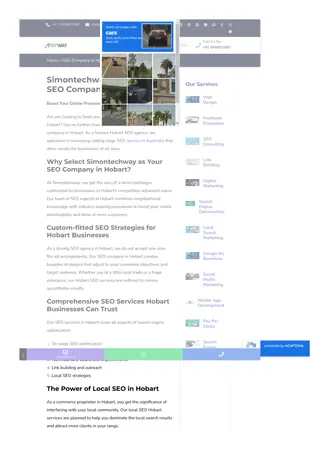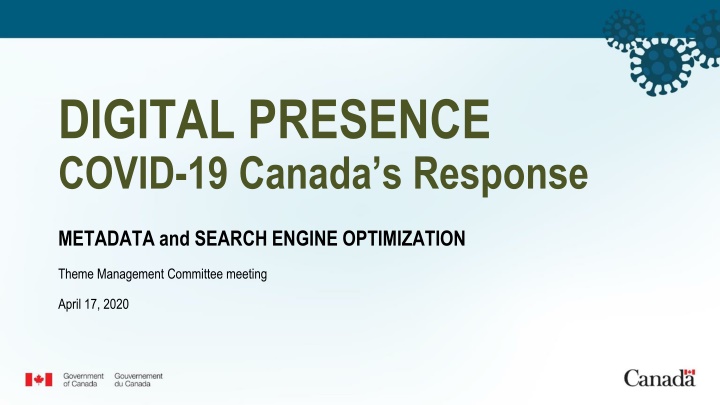
Optimizing Metadata for Increased Content Visibility
Enhancing metadata is crucial for boosting online content visibility and improving management efforts. By addressing metadata gaps and applying quality metadata, businesses can elevate their search engine ranking, content findability, and overall performance. This involves tagging content appropriately and utilizing key metadata fields effectively to enhance user experience and accessibility. The process includes analyzing metadata gaps, implementing structured data, and optimizing social media presence to maximize business value.
Uploaded on | 1 Views
Download Presentation

Please find below an Image/Link to download the presentation.
The content on the website is provided AS IS for your information and personal use only. It may not be sold, licensed, or shared on other websites without obtaining consent from the author. If you encounter any issues during the download, it is possible that the publisher has removed the file from their server.
You are allowed to download the files provided on this website for personal or commercial use, subject to the condition that they are used lawfully. All files are the property of their respective owners.
The content on the website is provided AS IS for your information and personal use only. It may not be sold, licensed, or shared on other websites without obtaining consent from the author.
E N D
Presentation Transcript
DIGITAL PRESENCE COVID-19 Canada s Response METADATA and SEARCH ENGINE OPTIMIZATION Theme Management Committee meeting April 17, 2020
CONTENTS Purpose Increasing business value Metadata gap analysis Applying metadata Next steps Structured data Social media 2
PURPOSE To support theme lead and partner departments to increase the business value of their web content through quality metadata. 3
INCREASING BUSINESS VALUE Canada.ca/coronavirus provides access to the authoritative source of federal information about COVID-19. Content is spread across most, if not all, theme spaces. For effective management and increased findability of content, it is essential to appropriately tag content pages. Applying complete and quality metadata will positively impact: Search results (Annex A) Content management efforts (Annex B) Performance measurement data (Annex C) Accessibility (Annex D) 4
METADATA GAPS ANALYSIS Assessment of top level pages from the COVID landing page (Canada.ca/coronavirus) indicates that metadata is currently: too general (not specific to page content), incomplete, or copied from other pages. Quality assurance checks are required, along with ability to go back to complete empty fields. For more information on the analysis results email: hc.cpab.health.theme-sante.dgcap.sc@canada.ca 5
APPLYING METADATA Metadata can support visibility of content but also contributes to an accurate and robust content inventory for theme leads and departments to manage and optimize their web holdings. Metadata fields: Metatitle (AEM & non-AEM Dublin Core) Description (AEM & non-AEM Dublin Core) Keywords (AEM & non-AEM Dublin Core) Primary topic / Additional topic (AEM) Content type (AEM) Audience (AEM) Owner organization (Confirm accuracy in AEM) Content provider (Beneficial for management of content internally to departments - AEM) 6
APPLYING METADATA Populate priority fields: Metatitle is the most important piece for your page it is your elevator pitch next to other search results must be unique, accurately summarize, and distinguish the page content 70 characters or less (longer ones are truncated in search display results) ensure COVID-19 or Coronavirus is found close to the beginning Description complements the metatitle it elaborates on your metatitle and shouldn t simply be repeated title text text may be displayed in Google as the search result description for a page it is a boosted field in the Canada.ca search engine provides concrete summary (sentence or clause form) of what the user will find or do on the page (e.g. what task they can complete) 130 characters or less 7
APPLYING METADATA Completing other metadata fields: Keywords it supports users in finding your page using different but relevant search terms add common search terms, whether found in content or not, to heighten visibility in search results as relevant content do not repeat common terms unless necessary in relation to page content AEM space limit is 400 characters with spaces First: use Coronavirus, COVID-19, Canada, pandemic Second: apply most relevant words from the page (e.g. task or information-based) Audience identifies who the content is written for select from controlled vocabulary 8
APPLYING METADATA Content type describes the nature or genre of the content (not about the content of the page) select from controlled vocabulary (e.g. education and awareness) Primary topic / Additional topic for content related to COVID-19 populate Primary topic with the value Health/ Diseases and conditions/Diseases/Coronavirus(COVID-19) from the pick list for additional topic value, select another topic tree value relevant to the content (as applicable) In AEM, more than one additional topic value can be added 9
NEXT STEPS 10
STRUCTURED METADATA Structured data is complicated but promises potential benefits. The adoption of structured data on Canada.ca is currently being explored. When used, structured data can improve: Task performance Ranking on Google Visibility (rich snippets) on Google Results in voice search across Google and Alexa If you are interested in participating in a pilot, please contact Principal Publisher via email: na-ai-ia@hrsdc-rhdcc.gc.ca 11
SOCIAL MEDIA There are many important messages being conveyed through web content on Canada.ca/coronavirus. Canadians could be provided with the opportunity to share correct and relevant information from web pages with friends and family through social media. Ensure your page has a good title and description, as they will be displayed when the page is shared. Pick an image to be used by social media Test how it appears on Facebook and Twitter Add metadata tags for Twitter and Facebook (e.g. Open Graph) Og:title, og:type, og:url, og:image, og:image:alt, og:description 12
RESOURCES FOR DEPARTMENTS COVID GC wiki: https://wiki.gccollab.ca/Covid_19_DTO-BTN Includes guidance on: Digital strategy Crisis communication content design Alerts Vanity urls Branding (https://gcconnex.gc.ca/file/group/61785806/all#) Content mapping Metadata (instructions, tool and deck) UTM codes Performance measurement 13
ANNEX 14
ANNEX A: IMPACTS ON SEARCH Improved search results would come from including: well-written and well-structure content unique title and description clearly representing page content relevant search terms in keywords (Canada.ca search only) last modified date (boosts latest documents in Canada.ca only) added robots metadata to control search results (index, de-index) creator, audience or type to enable ability to filter search results (Canada.ca only) common naming convention for metadata keywords in URLs 15
ANNEX B: IMPACTS ON CONTENT MANAGEMENT Through quality metadata, we see: more accurate content inventory, that can be leveraged by Theme Leads to be used for various purposes (e.g. filter content by owner, support IA mapping exercises, improve publications management) allows for bulk updates to pages ability to use this information to support decisions on optimization, reduction and retention of content (e.g. ROT efforts) 16
ANNEX C: IMPACTS ON PERFORMANCE MEASUREMENT Quality and complete metadata allows for: Canada.ca-wide performance measurement where analytics can then support decision making on content development and optimization establishing relationships between web pages and data to better enable analytics tracking (e.g. traffic patterns) quicker and more agile analytics reporting 17
ANNEX D: IMPACTS ON ACCESSIBILITY Some considerations for accessibility: headings offer a quick overview for the screen reader user language attribute helps the screen reader to select the correct voice reader good descriptions help the screen reader user to select the appropriate search result from Google or Bing 18

